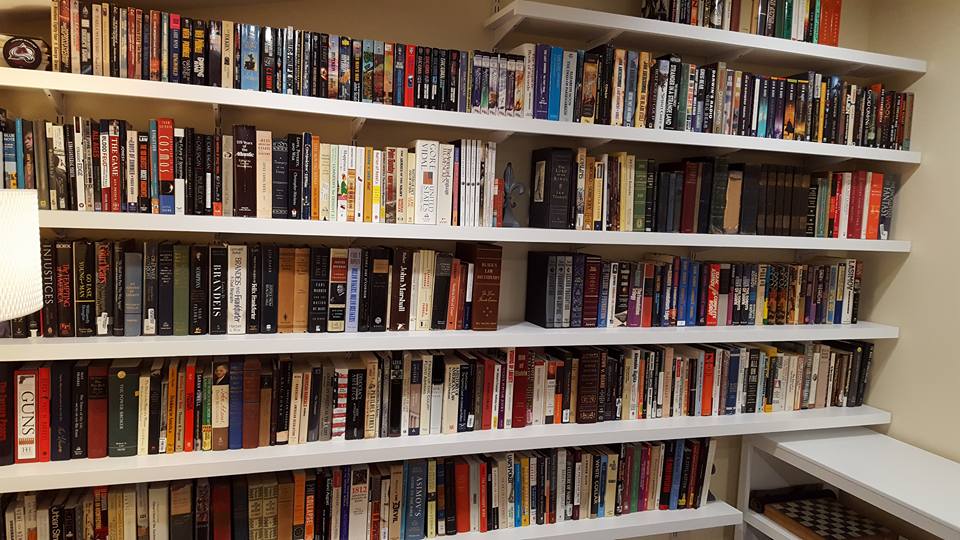One of my favorite classes back in my law school days was Law in Literature. The course was fairly simple: the class read a variety of literary works that included legal themes; the students gathered once a week to discuss them; and each student wrote their own short story for the final grade. I did very well in the class, but more importantly, I enjoyed it.
My favorite genres of literature are science fiction and fantasy. I am largely bored by realistic depictions of the world as we know it. Though character-driven writing is something I like, I also want a world in which the author speculates about alternative possibilities. Alternative government types, alternative technologies, alternative relationships between peoples and races, and, of course, alternative legal systems.
Legal issues generally don't come up much in most popular science fiction and fantasy. But sometimes they do. One of the stories we read in my Law and Literature class was "The Bicentennial Man" by Isaac Asimov. In that story, a robot realizes that he wants to become human, so he embarks on a slow journey to transform himself from cold steel and machinery to warm flesh and blood. He undergoes extensive surgery and replaces his mechanical parts with organic parts, one at a time, until he is entirely organic and not a machine at all.
One of the themes of the story is mortality, of course (robots never die, but humans assuredly do). But another is humanity itself - that is, what it means to be human, and who qualifies. The robot must eventually hire a lawyer who argues that, with a human heart and mind, he qualifies as human and should be freed of the strict laws that regulate everything robots can do, even though he was "born" a robot.
The Bicentennial Man covers a lot of legal ground in very general terms. Asimov was a scientist by training, not a lawyer, so he didn't focus much on the procedural aspects of the robot's legal journey. The reader assumes that the action in court plays out in ways we are already familiar with. The story takes place on future Earth whose society has origins that are most certainly our own.
One could say that Asimov was concerned with substantive due process rather than procedural due process. That is, the questions of what our rights are and who qualifies for them. Procedural due process, by contrast, turns on a question of fairness. Can rights be infringed? And if so, when and how is the government allowed to infringe them?
Elizabeth Moon tackles this latter aspect of the law in her book The Sheepfarmer's Daughter. The book, the first in a trilogy, is about a woman named Paksenarrion who joins a mercenary army as a teenager and eventually finds her destiny as a powerful paladin. Early in the book, "Paks" is involved in a violent altercation with a fellow recruit but that recruit remembers little of the attack and Paks is named as the instigator by a second soldier. The superior officers must solve the mystery, and to do so they initiate a court martial process with several unique aspects.
First, one of the officers is appointed to investigate Paks, who is in the infirmary with serious injuries. Paks, despite her serious wounds, is locked in chains in a prison cell. But the investigating officer senses something is wrong because Paks is seriously hurt but the others are not. The higher-ups are not inclined to believe Paks' story, but the officer makes a compelling case and a full trial is ordered.
In order to conduct the trial, the officers must issue summons to two "witnesses." One, a man, is the mayor of a city. The other, a woman, is a war hero. The witnesses are respected members of the government and military who are trusted for their experience and reputations. They are not lawyers nor appear to have any legal training.
The witnesses arrive and, in front of the entire assembled unit to which Paks and her attacker belong, physically assess the parties involved. At one point, they strip naked both Paks and the recruit accused of fighting with her to inspect their injuries (the other recruit has only bruises and two broken fingers, while Paks is swollen all over and covered in blood). The female witness, noting the obvious discrepancy of the parties' conditions, demands Paks be released from custody and treated for her wounds until the investigation is concluded. The officers immediately comply with her demands - apparently her status as "witness" gives her such authority - and take Paks away from the assembly and to the infirmary.
Then the witnesses - again, in front of the entire assembled military unit - take testimony. They interrogate the investigating officer. They determine more testimony must be taken - especially that of the other soldier who gave the most lucid account of the incident - and refer the proceedings to the jurisdiction of the local monarch, the so-called "Duke's Court."
Eventually, after more physical evidence is assessed and more testimony is taken, the captain of the military unit reaches a verdict "on the basis of the witnesses' reports, conferences with [supervising officers], and an interview with [the other recruit involved]." The Captain gives the full assembled unit an account of his findings, and then orders a combination of punishments including public flogging and exile.
The investigation and trial are well-told in the story, and make for an interesting spin on the court martial process we apply in our own military. Elizabeth Moon is nothing if not a very thorough writer, and the sequence was a good way to make interesting what could have been a dull recounting of medieval military training.
If we are to speculate about other societies, in space or in medieval fantasy worlds, we should not just speculate about economies and technology. In our world, how we resolve disputes through our legal system is a critical, foundational part of our society. So, too, would it be in some other civilization, far into the spacefaring future or in some alternate dimension where wizards inhabit tall towers and giant lizards haunt the skies.
As I read science fiction and fantasy stories, I make note whenever obvious legal themes arise, and perhaps someday I'll turn my findings into a longer and more formal piece. After all, what could be more fun than a lawyer turning stories about space ships and dragons into a law review article?







